お知らせ
2016年卒業式が挙行されました
本日は、春の訪れを感じさせる青空の下、中島英史秋田県副知事をはじめとして多くの来賓に御参列いただき、国際教養学部186名卒業生及び専門職大学院5名の修了生が新たな一歩を踏み出しました。
式辞 国際教養大学 学長 鈴木 典比古
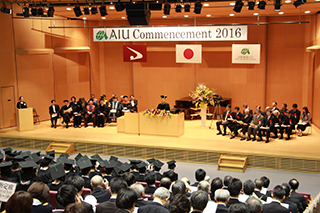 国際教養大学での学業を終えられ、栄えある御卒業を迎えらえた186名の皆さん、本日は誠にお目出度うございます。また、本日修了式を迎えられた専門職大学院グローバル・コミュニケーション実践研究科の学生諸君に心からお祝いを申し上げます。本日の諸君の晴れの門出を心待ちにしていた御父母や関係者の皆さま方もこの卒業式においで頂いていますが、その皆さんにも衷心よりお祝いを申し上げます。
国際教養大学での学業を終えられ、栄えある御卒業を迎えらえた186名の皆さん、本日は誠にお目出度うございます。また、本日修了式を迎えられた専門職大学院グローバル・コミュニケーション実践研究科の学生諸君に心からお祝いを申し上げます。本日の諸君の晴れの門出を心待ちにしていた御父母や関係者の皆さま方もこの卒業式においで頂いていますが、その皆さんにも衷心よりお祝いを申し上げます。
国際教養学部の卒業生の皆さんは本学が8回目に社会に送り出す方々であります。これまでに本学を巣立った卒業生数は1,407名になります。これは誠に小さな数字であります。しかし、この小さな数字を構成する皆さん一人ひとりは誠に大きな将来のポテンシャルを有する個人であります。皆さんをこのような‘大きな個人’に育て上げたのは本学の国際教養教育、International Liberal Arts Educationであります。
専門職大学院のグローバル・コミュニケーション実践研究科は高度な国際コミュニケーションの理論と実践に係る知識と技能を身につけ、グローバル社会において、外国語により業務ができる高度専門職業人を養成するという教育目標を掲げ、2008年に開設されたこの種の大学院としては我が国で初めての専門職大学院であります。人数的に少ないですが、本日ここに、英語教育実践領域で2名、発信力実践領域で3名の諸君にそれぞれの学位を授けることは本学の誇りであります。
さて、みなさんが本学において身につけた国際教養、International Liberal Artsとは何であったのでしょうか。いま、InternationalとLiberal Artsを分けて考えてみましょう。まず、Liberal Artsですが、リベラルアーツの語源はラテン語のArtes Liberalesであり、英語ではThe Art of a Free Person、日本語では「自由人になるための学芸」ということになります。この、「自由人になるための学芸」というのは、2千年以上も前のギリシャ・ローマ時代には国内に都市国家群が成立していましたが、それぞれの都市国家を防衛し、運営し、発展させていく責任ある行動力とリーダーシップを有する自由な人間になるために必要とされる技芸や学問であり、知性・体力・倫理・行動をすべて含めた全人的能力を鍛錬するものでありました。その理想的な人物は古代オリンピック選手に顕れております。
やがて、中世に入ったヨーロッパでは、当時の封建制度の束縛や抑圧から人間を解放(liberate a person)するため、人文主義者達によって人間形成のための教育として体系化されます。それは基礎的な学問としての3つのTrivium、即ち文法、修辞法、論理学の3分野を修めた学生をBachelor of Arts「学士」と呼び、更に上級的な4つのQuadrivium、即ち幾何学、算術、音楽、天文学の4分野を修めた人をMaster of Arts「修士」と呼びました。その上に法律、医学、神学を修めた人をDoctor of Philosophy「博士」と呼んだのであります。
このように、今日の学問の分野で言えば人文科学、社会科学、自然科学の全ての分野で訓練を施し、全人力を持つ人間を創り上げてゆくことがリベラルアーツであったのです。中世のルネサンス期を中心に活躍したレオナルド・ダ・ヴィンチやミケランジェロやガリレオ・ガリレイやエラスムス等にその典型的人物像が見られます。
その後、ヨーロッパからアメリカに渡ったリベラルアーツ教育はアメリカという新天地で「個」を確立する教育として受け入れられ、更に社会や政治や産業の分野におけるリーダーを育成する教育へと変貌して行きました。そして第2次世界大戦後、そのようなリベラルアーツ教育が日本にもたらされたのであります。それはギリシャ・ローマの発祥の地から2千数百年の旅を経てきたものであります。
このように壮大な歴史的背景を持つリベラルアーツ教育は、本学ではどのように展開されているのでしょうか。諸君は本学のカリキュラムの中でTOEFLに始まり、EAPへと連動する英語集中プログラムの洗礼を受け、基盤教育に進み、グローバル・ビジネス課程とグローバル・スタディズ課程を擁する専門教養教育を修了しました。全ての科目が英語で行われ、その授業は教員と学生間の、あるいは学生間の対話によってなされることを基本的枠組みにしていました。英語による授業の他にも、諸君は学生寮での留学生達との共同生活や1年間の海外留学生活によって、他の大学であったならば経験することの出来なかった国際的学生生活を体験したのであります。このような国際的体験が本学のリベラルアーツ教育をして国際教養教育、International Liberal Artsと呼ばしめる所以であります。
このような国際教養教育の土台の上に、本学は2014年9月に文部科学省によって「スーパーグローバル大学創成支援」事業に採択されました。この事業は今後10年間をかけて本学をグローバル人材を育成する「日本発ワールドクラスリベラルアーツ大学」に進化させていく、というものであります。
世界は今、グローバル化が加速度的に進んでおります。その行き着く先では、世界の人々のライフスタイルや思考形式の同質化が進んでいるでありましょう。
我々は運命共同体としての「宇宙船地球号」に乗船していることを強く意識するようになっています。しかし、同時に、我々は「宇宙船地球号」の上で世界各地の地域的特徴を保ち、各地の生活や文化や歴史の多様性を豊かに維持することも、人類の将来にとって不可欠の課題であることにも気付いています。かくして「宇宙船地球号」の上で、グローバリゼーションによる世界同質化がもたらされ、それは利便性、合理性、経済性を強める一方で、各地域の豊かな多様性、独自性、創造性等のローカリティを十分に確保していかなければなりません。この、グローバリズムとローカリズムの双方からの要請をダイナミックに均衡させながら進んでいくこと、これが「宇宙船地球号」の操舵をする者の責任となります。
ではもう一度、卒業生修了生諸君、卒業おめでとう。くれぐれも健康に留意して元気に飛び立っていってください。
卒業生代表挨拶 グローバル・スタディズ課程 鈴木 優生
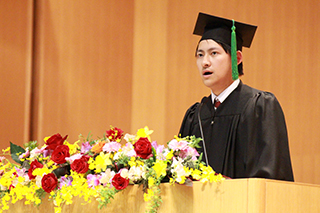 挨拶に先立ちまして、ご来賓の皆様を始め、お集まりいただいた先生方、ご家族、ご友人の皆様、そしてご出席いただいた全ての方々に御礼を申し上げます。この度は、私たち卒業生のためにこのような素晴らしい式典を開いてくださり誠にありがとうございます。頂いた祝福や応援のお言葉は、新しい世界へと飛び立つ私たちに勇気を下さいました。本日、私たち卒業生は慣れ親しんだ学び舎を離れ、新たな人生の第一歩を踏み出します。
挨拶に先立ちまして、ご来賓の皆様を始め、お集まりいただいた先生方、ご家族、ご友人の皆様、そしてご出席いただいた全ての方々に御礼を申し上げます。この度は、私たち卒業生のためにこのような素晴らしい式典を開いてくださり誠にありがとうございます。頂いた祝福や応援のお言葉は、新しい世界へと飛び立つ私たちに勇気を下さいました。本日、私たち卒業生は慣れ親しんだ学び舎を離れ、新たな人生の第一歩を踏み出します。
この秋田の地で国際教養大学が開学したことは、秋田で生まれた私にとって非常に幸運な出来事でした。山々に囲まれた小さな集落出身の私が、英語を話し、留学を経験し、海外で働くことになるかもしれないことを、誰が予想できたでしょうか。今の私があるのは、AIUのお陰です。
「なぜ英語で勉強しなければならないのか」全ての授業が英語で行われると知りながら入学したはずなのに、入学当初はこの問を何度も考えてしまいました。最初の数ヶ月は、たった数ページの課題を読むのにも、1ページの英作文をするにも、一晩かかっていました。友人とともに図書館やパソコンルームで課題に取り組んだ時間は数えきれません。辛い日々でしたが、英語で読み、考え、伝える力を養うためには必要な期間でした。クラスメートとの議論に慣れたのもこの時期でした。授業中のディスカッションを通じて、同じ日本人の中でも多様な価値観が存在することを知ったときは、少し驚きました。AIUに入学するまで、そうした機会はあまりなかったからです。
当たり前のことですが、留学先ではその違いがより鮮明になりました。私が出会った学生や地元の人々は、全く違った文化の中で生きています。話し方、服装、食事の仕方など、ほんの些細なことで相手の気分を害してしまうこともありました。そのような状況に陥る度、相手の視点に立って気持ちを理解しようと努めるようになりました。語学力だけでなく、相手の意見に耳を傾ける姿勢も大切だと学んだのです。
こうした経験を通じて、私は多くのことを知ることができるようになりました。世界中の本を読んだり、人と話したりすることで、人間が長い歴史の中で積み重ねてきた知識に触れることが出来ます。何百年も前のヨーロッパの思想家の考え方を知ると、自分も長い学問の歴史に参加できた気分になり、クラスメートと討論をすると、議論好きの古代ギリシャ市民になったかのような気持ちになりました。そうしたとき、AIUが目指す国際教養教育の理念を、ほんの少しだけ達成できたように感じます。
残念ながら世界には未だに、古い伝統にばかりとらわれ、他人の考え方や価値観を理解しようとしない人たちがいます。そのような人たちが引き起こす問題が報じられる度、他者をあるグループの一員としてではなく、それぞれ固有の考え方を持った個人として受け入れられる人間が、必要とされているのではと感じます。私たちAIUの卒業生には、まさにその素質があります。だからこそ、AIUは社会から期待の目を向けられているのです。
AIUの地位は、中嶋前学長の作り上げた基礎と先輩たちの努力によって築かれたものです。卒業生として、自分の進む道で成果を上げ、AIUの伝統を後輩に引き継いでいく責任があります。ただそれは、この先も今のままのAIUで良いという意味ではありません。開学から約12年。AIU生が社会で果たすべき役割は変わり始めています。在校生の皆さん、鈴木学長のリーダーシップと支えを受けて、常に新しいAIUのあり方を目指してください。
最後に、卒業生を代表して、これまでお世話になった方々に、今一度御礼を申し上げます。先生方は、未熟な私たちの質問に耳を傾けてくださり、私たちに道を示してくださいました。事務局の皆様は、私たち学生が誤った道に進まないために、いつもそばで見守ってくださいました。ともにAIUで学び、たくさんの時間を過ごした仲間たち。これからは離れ離れになりますが、再会した瞬間、これまで通り語り合えることを、私は知っています。そして遠く離れた故郷から、いつも私たちを想ってくれた家族へ。家から届く宅配便の箱の中には、食べ物や生活用品とともに、あなたたちからの愛が込められていたことを私たちは忘れません。最後に、私たちを暖かく包み込んでくれた秋田と地域の方々へ。古き良き日本の自然の中で過ごした日々を、私たちはいつまでも覚えています。
今日、私たちは世界という大海原に自分自身のボートに乗って旅立ちます。新しいことを知りたいという好奇心と、物怖じしないコミュニケーション能力を手に、大海原を渡っていくのです。旅の途中で孤独に感じることもあるでしょう。しかし、同じように旅をしている仲間がこの海のどこかにいるという事実は、立ちはだかるどんな困難をも乗り越える勇気をくれることでしょう。今日は私たちの船出の日です。いつの日か遠い異国の地で、また皆さんとお会いすることを楽しみにしています。ありがとうございました。
修了生代表挨拶 英語教育実践領域 難波 直弥
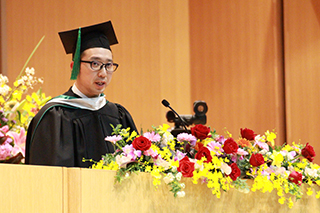 本日ご臨席を賜りました、来賓の皆様、教職員の皆様、そしてクラスメートの皆さんに心より感謝申し上げます。2016年大学院修了生を代表し、本日ここでスピーチできますことを誇りに思います。
本日ご臨席を賜りました、来賓の皆様、教職員の皆様、そしてクラスメートの皆さんに心より感謝申し上げます。2016年大学院修了生を代表し、本日ここでスピーチできますことを誇りに思います。
本大学院に入学した時、私はすでに10年の教員経験を持っておりました。在職期間中もさまざまな研修に参加しましたが、自身の指導法について、批判的な視点から評価される機会は十分ではないと感じていました。そのような機会を望んでいた私にとって、国際教養大学大学院の英語教育実践領域はまさに最適な場であると確信していました。ここで学ぶ機会を与えていただいたことに本当に感謝しております。
さて、本学で学んだ中でもっとも素晴らしかったことは、「なぜ」や「どうやって」を深く考える機会に恵まれたことです。具体的には、なぜ特定の活動やフィードバックの仕方、テストの方法が特定の目的を達成するために優れているのか、いないのか。生徒が特定の目標を達成するためにどのように指示を与えるべきかといったことを、授業を通して常に考えさせられました。また、デモレッスンや実習を通して、授業で学んだことを実践に移す機会も十分に得られました。その中で、私は常に自身の答えを模索し続けました。先生方は効果的な助言により、よりよい指導のきっかけを作ってくださいました。英語教育実践領域の先生方は、これまでも、そしてこれからも、教育者としてのモデルであり、私の目標であります。
クラスメートの皆さんにも大いに刺激を受けました。彼らが一生懸命学ぶのを目にするたびに、自分にはもっと努力が必要だと思いました。また、現職教員として、彼らの前で怠惰な姿勢は見せられないと思っていました。加えて、彼らのデモレッスンやプレゼンテーションからはいつも新たな発見があり、自分が今までに注目していなかったことに気づかされました。私自身の発表に対する彼らからのフィードバックも、自分の考えをアップデートしてくれるものでした。そんな熱意にあふれるクラスメートと協力したり、競争したりすることで、私はベストを尽くすことができました。皆さん一人ひとりに感謝しています。
以前に比べ、今や世界中の人々がよりつながりをもてる時代になりました。ある地域で作られたサービスや製品は、今やほぼ世界中で利用可能です。これはグローバリゼーションによるものであり、この波は止まらないでしょう。教育機関も世界中に広がり、母国からよりよい教育環境を求めて移動することも容易になってきました。その結果、異なる背景を持つ人々や文化の統合が生まれています。そのような世界情勢において、英語がコミュニケーションツールとして重要な役割を持っていることは疑いようがありません。それゆえに英語は、グローバリゼーションに対応するため、日本で最も重要視されてきた教科のひとつであります。外国語教育の強化のもうひとつの要因として、2020年の東京オリンピック、パラリンピックの開催も挙げられます。多くの人々が海外から日本にやってくると予想されます。現在、小学校5、6年生が週1時間の英語活動を行い、中学生は週4時間英語の授業があります。しかし、文部科学省は2020年までに英語を正式な教科として小学校5、6年生に導入するとともに、高校、大学入試の改正や教員の研修や指導力の向上を目指す計画を示しています。私は国際教養大学が教員を目指す生徒と現職の教員双方にとって最適な研修環境であると信じています。なぜならここでは「英語を英語を通して指導する」ことがどのようなものなのかを実感できるからです。そして私がここで学んだことは、現在の、そして将来の日本の英語教育の基礎となるものだと確信しています。
私はこの4月から秋田県の高等学校で再び勤務することになります。AIUでの経験を最大限に活かし、秋田県の英語教育の発展に貢献したいと思います。同時に、私自身、よりよい英語教育について学び続けたいと思います。よい教員とは、自身が学ぶことが好きであり、教育や教材に対して常に情熱を持って生徒を刺激し続けるものです。また、生徒により質の高い教育を提供するために、自分自身の知識や技術を刷新し続けるものです。教育のプロフェッショナルとして。そのような教員は新しい教育方法やテクノロジーを学んだり、実践したりすることを恐れないのです。そして進んでそれらを仲間と共有することができるのです。私はこのような精神を絶対に忘れません。
今、私たちはAIUを離れます。19世紀のアメリカの詩人であり、哲学者、エッセイストでもあったラルフ・ワルド・エマーソンは次のように述べています。「敷かれた道を進むより、道なきところに自ら道を築いて進め。」私たちがここで学んだことは私たちの羅針盤となり、どこへ進むべきかを指し示してくれるでしょう。これは私たちが道を切り開くために必要となる、最も重要なツールのひとつです。それは卒業証書ではありません。私たちが学んだこと、そしてAIUで受けた教育を用いてできることに他なりません。
最後に、私はここでのすべての出会いを生涯大切にしていきたいと思います。そして皆さんの将来に幸多からんことを。
ご清聴、ありがとうございました。
※実際のスピーチは英語で行われておりますが、ここでは日本語訳を掲載しております。
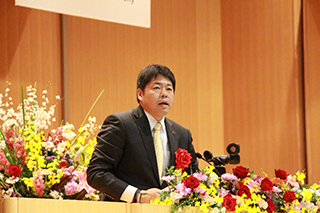 中島秋田県副知事御祝辞 |
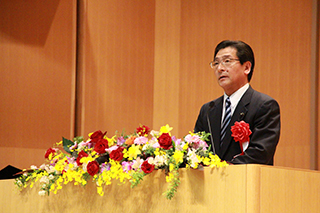 近藤秋田県議会副議長御祝辞 |
|
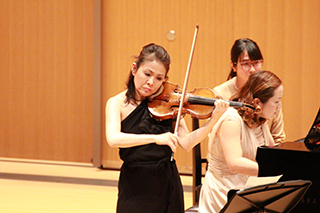 渡辺特任教授による祝賀曲演奏 |
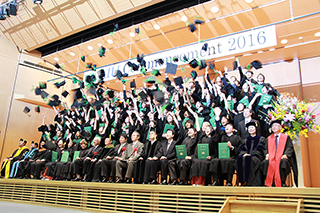 記念撮影の様子 |
Blessed with blue sky that hinted of spring, AIU’s Commencement ceremony 2016 took place on March 21, 2016. The honorable guests including Mr. Hidefumi NAKASHIMA, the vice governor of Akita Prefecture attended this ceremony to celebrate the departure of the 186 AIU delegates from the undergraduate program and 5 from the graduate program for the societies across the country, and even beyond.
President’s Commencement Address
Norihiko SUZUKI, DBA
 Congratulations to all of you on your graduation! 186 students have completed their study at AIU this year. Also, I would like to extend my heartfelt congratulations to all those students who are completing the graduate program in Global Communication and Language Practices. My sincere congratulations also go out to the parents, family and friends who have been eagerly waiting this happy day.
Congratulations to all of you on your graduation! 186 students have completed their study at AIU this year. Also, I would like to extend my heartfelt congratulations to all those students who are completing the graduate program in Global Communication and Language Practices. My sincere congratulations also go out to the parents, family and friends who have been eagerly waiting this happy day.
This year marks the 8th AIU commencement, and the number of AIU graduates who have entered society will now total 1,407. Compared to other universities’ graduates, this number may be considered very small. However, each of our graduates has tremendous potential for the future. It is because AIU’s international liberal arts education has cultivated each of you into ‘thoughtful individuals.’
The mission of the Graduate School of Global Communication and Language, which was established in 2008 as the nation’s first professional graduate school, is to nurture highly specialized professionals who are capable of working in multiple languages in a global society, with advanced understanding of international communication theories as well as practical knowledge and skills. Although the number is still small, AIU is proud to award a Master’s degree to 2 students from the English Language Teaching Practices and 3 from the Global Communication Practices.
Let us take this opportunity to consider just what an international liberal arts education is. The term “liberal arts” originated from the Latin word “artes liberales” which in English means “The Art of a Free Person.” This educational philosophy was developed more than two thousand years ago, in the Greek and Roman eras, during when many Greek and Roman city-states were formed. In those city-states, education was offered to the younger generation in order to nurture their ability to defend, manage and develop the city-state through responsible behavior and leadership. The focus was on developing a person’s intellect, physical strength, ethics and behavior, much like ancient Olympic athletes.
During the Middle Ages in Europe, the need for liberation from the restriction and oppression of the feudal system led to the emergence of a humanitarian approach to creating a systemized education system. In this system, students were trained in three basic subjects: grammar, rhetoric and logic. Students that trained in these subjects were known as Bachelors of Arts. Those who learned the four advanced subjects of quadrivium; which included geometry, arithmetic, music, and astronomy, were called Masters of Arts. And those who completed the study of law, medicine and theology were called Doctors of Philosophy.
Thus, the liberal arts denoted an education that provides knowledge in multiple fields of study. This is reflected in the current curriculum of humanities, social sciences, and natural sciences, which develop a broad spectrum of a person’s intellectual abilities. Famous figures that trained in the liberal arts include Leonardo da Vinci, Michelangelo, Galileo Galilei, and many others.
In modern times, the liberal arts style of education spread from Europe to the United States and consequently led the western world with the aim to educate the “whole person” and transform education so it would cultivate leaders who can play active roles in society, politics and industry. The liberal arts style of education was eventually brought to Japan after World War II. Through its long journey from Greece and Rome thousands of years ago to Japan today, we can say that the liberal arts style of education has had a distinguished history.
So exactly, how does AIU provide students with a liberal arts education Well, all of you started AIU’s curriculum by taking the TOEFL exam and underwent rigorous English training in EAP. You then moved through BE coursework to GB or GS, and completed your advanced education in a specific area of study. All your courses were conducted in English and revolved around dialogue between faculty and students, and among students. Besides classes being held in English, through your one-year study abroad and shared dormitory life with international students, you were also able to experience a diverse international environment, which you would not have been provided with at other universities. These international experiences have led to AIU’s education being called an “international liberal arts education.”
Based on the promise of this international liberal arts education, AIU was selected as a grant recipient of MEXT’s Top Global University Project, also known as the “Super Global University Project,” on September, 2014. The aim of this project is to turn AIU into “Japan’s World-Class Liberal Arts University” in the next decade.
Our society is globalizing at an accelerating pace, which could lead to the homogenization of life-styles or a shared way of thinking all over the world. People tend to have a strong notion that we are on the same “Earth Spaceship,” sharing a common destiny. At the same time, however, we “crew members” need to be aware how important and imperative it is for human beings to maintain their local characteristics as well as to preserve the rich life, culture and history that is a part of their national heritage. Thus, on “Earth Spaceship,” it is necessary to ensure adequate localism including diversity, identity and creativity in each area while at the same time taking advantage of the convenience, rationality and economic efficiency that are ushered in by globalization. To move forward maintaining a dynamic equilibrium between globalism and localism is your duty as pilots of this “Earth Spaceship.”
Again, my sincere congratulations on your success. Take good care of yourselves. Good luck and best wishes.
Valedictory Address
Global Studies Program
Yuki SUZUKI
 First of all, I would like to express my heartfelt gratitude to all the guests, professors, families, friends, and everyone in attendance. We graduates sincerely appreciate you holding such a memorable graduation ceremony. We are also grateful for all the notes of encouragement and congratulations, which give us the courage to enter the new world. Today we are leaving our home, Akita International University, to begin the next chapter of our lives.
First of all, I would like to express my heartfelt gratitude to all the guests, professors, families, friends, and everyone in attendance. We graduates sincerely appreciate you holding such a memorable graduation ceremony. We are also grateful for all the notes of encouragement and congratulations, which give us the courage to enter the new world. Today we are leaving our home, Akita International University, to begin the next chapter of our lives.
The luckiest thing that has happened to me in is that AIU was established in Akita, where I was born. Who could imagine a boy who was born in a very small village surrounded by mountains could finally learn how to speak English, could experience study abroad, and could get a job, which may take him to other countries. None of these could have happened without AIU.
“Why am I studying in English?” Even though I knew that every class was in English, I couldn’t help thinking this question again and again, while taking classes at first. For the first couple of months, only a few pages of reading took a whole night to finish; writing a one page essay took another. I spent countless hours stuck in the library or the computer room with friends who were in the same situation. Those painstaking days, in the end, enabled me to read, think, and express my ideas in English. It was during this period, when I got used to exchange ideas with classmates through discussion. In fact, I was little surprised when I realized the diversity of the ideas and values among Japanese students, because I didn’t have chance to know that before entering AIU.
Those differences became more apparent when I went to study abroad. The students and people I met there lived in a culture which was completely different from mine. I noticed the way I talk, the way I dress, and the way I eat can sometimes touch someone’s nerve. Every time I faced those situations, I tried to see things from their perspective, in order to understand them better. Through the life in AIU, I learned not only the language skills but also the attitude to listen to ideas and values of other people.
All those experiences helped me obtain the freedom to learn anything I want. Now I’m able to access the knowledge accumulated in the world by reading materials or by talking with people around the world. I remember I felt like I was taking a part in the long history of academia, when I was reading old documents of great thinkers who lived in Europe centuries ago; when I was debating with my classmates, I remember I felt as if I was a Greek civilian who enjoyed the discussion ages ago. Those were the moments when I feel a little sense of accomplishment as an AIU student, because I believe this is one of the results of what we call Liberal Arts education.
Looking around the world today; however, we see there are still some people who stick to old traditions and are unwilling to understand the norms and values that other people have. Whenever I see the news of the problems that are caused by those people, I feel the world needs more people who accept others as independent individuals who have their own values and ideas, without judging others by the group to which they belong. And we, AIU graduates, have the privilege and ability to become. That is why AIU continues to attract the eyes of society.
AIU is what it is today because the former president Nakajima laid the foundations for us, and our seniors worked so hard to build AIU’s current status. As AIU graduates, we must continue to thrive and pass on our traditions to the next generation. But this doesn’t mean AIU shouldn’t change. With AIU’s 12th anniversary coming up, the roles that we are expected to play are starting to change. Fellow students, please keep making AIU new with the leadership and support of President Suzuki.
As my concluding remark, I would like to express my gratitude, on behalf of the graduates, to all of the people who supported us. Thank you to the professors for patiently listening to our immature questions, giving us precious advice, and directing the path that we should take. Thank you to the office staffs for always being around to support us and make sure we stay on the right track as a member of society. Thank you to the friends who spent priceless and countless days and nights together. Though we will be separated by physical distance, I know that when we meet up again, it will be just like old times. Thank you to the families for always worrying about us from our home far away. The delivery boxes you have sent to us were always filled with not only food and goods, but love from home. And finally, I want to say thank you to Akita and people living here for warmly embracing us. The time we spent in the good old nature of Japan is the precious treasure that we will keep in our minds forever.
Today we begin our journey to the ocean called the world in our own boats. We have desire to learn in one hand, and communication skills in the other. With these two paddles, we sail across the world. We may feel lonely in the midst of our expedition, but the fact that we are all in the same ocean will give us the courage to overcome any difficulties that come our way. Today is our sailing day, and we hope someday we will see each other again on the other side of the world.
Graduate Program
English Language Teaching Practices
Naoya NAMBA
 Good afternoon, ladies and gentlemen, honored guests, faculty and staff members, and my fellow classmates. I’d like to thank all of you for coming to this commencement ceremony. Today it is a great honor for me to deliver a speech on behalf of the graduate class.
Good afternoon, ladies and gentlemen, honored guests, faculty and staff members, and my fellow classmates. I’d like to thank all of you for coming to this commencement ceremony. Today it is a great honor for me to deliver a speech on behalf of the graduate class.
When I entered this graduate school, I had already had 10 years of teaching experience. While I taught in senior high schools in Akita, I had various kinds of workshops for English teaching skills. However, I did not have enough opportunities to have my own teaching evaluated from a critical point of view. I had been seeking such opportunities and I was certain that the English language teaching practices here at AIU was the best course for that purpose. I deeply appreciate that I was given the opportunity to study here as a full-time student.
The best thing of my studying here is that I could have plenty of time to think deeply about “why” and “how.” Why is a certain activity, a certain way of feedback, or a certain way of testing good or bad for a certain purpose How should I give students instruction to achieve a certain goal In addition, I could have a lot of demo lessons or teaching practicum, which made me carry the theories into practice in the actual teaching situations. I had been trying to find my own ways of teaching and the ELT professors gave me a lot of suggestions for improvement. The ELT professors have always been and will always be the model of the teacher and my goal.
My classmates also inspired me. Every time I saw them work hard, I recognized that I need further efforts. I thought that I must not show my laziness in front of the hard-working classmates as an in-service teacher. In addition, the peers’ presentations or demo-lessons made me aware of a lot of things that I had not focused on before. The peers’ feedback toward my presentations also updated my ideas. I was able to do my best through cooperation and competition with my enthusiastic peers and I’m grateful to each of you.
Now, people from different parts of the world have become more connected than they were before. Services and products produced in one part of the globe are becoming available in almost all parts of the globe. This is because of globalization which has become a major tidal wave that cannot be stopped. With educational institutions spread across the globe, it has become easier to move from home countries for better education opportunities. This has led to integration of cultures and people from different educational backgrounds. In such a situation, there is no doubt that English plays an important role as a communication tool. Therefore, English has been one of the most emphasized subjects in Japan in order to pursue globalization. Another factor of the emphasis of foreign language education is the 2020 Tokyo Olympics and Paralympics, which will draw large numbers of foreign visitors to Japan. At present, English is offered to children once a week from elementary grade-five level and four times a week from junior high. However, an English-language reform committee set up by the Ministry of Education, Culture, Sports, Science and Technology (MEXT) came up with a number of recommendations about how Japan can do better namely, by elevating the importance of English listening and speaking; starting English in grade three of elementary school and making it a formal subject by grade five by 2020; modifying English assessments on high school and university entrance exams; and improving teacher training and classroom instruction. I believe that AIU is the perfect place for the training of both in- and pre-service teachers of English because we can find what “teaching English through English” is like. I am sure what I have learned here is the fundamental of the current and future English education in Japan.
I am going back to work from this coming April and teaching at a senior high school in Akita again. I hope to make full use of my experience here and make a contribution to the development of English education in Akita. At the same time, I would like to keep studying better ways of teaching English. I believe that a great teacher has his own love of learning and inspires students with his passion for education and for the course material. He constantly renews himself as a professional on his quest to provide students with the highest quality of education possible. This teacher has no fear of learning new teaching strategies or incorporating new technologies into lessons, and always seems to be the one who is willing to share what he’s learned with colleagues. I will never forget this spirit.
Now we are away from AIU. There is a famous quote by Ralph Waldo Emerson, who was an American poet, philosopher and essayist during the 19th century, “Do not go where the path may lead, go instead where there is no path and leave a trail.” What we have learned here is our compass and it will always point where we should go. This is one of the most important tools needed to open our path ahead. It is not the diploma itself that counts. It is about what we have learned and what we do with the education we have gotten in AIU.
Finally, I will treasure every meeting I have had here for my whole life and best of luck in all your future endeavors.
Thank you all very much for listening.
 Congratulatory Address by Mr. Hidefumi NAKAJIMA, Vice governor of Akita Prefecture |
 Congratulatory Address by Mr. Kenichiro KONDO, Akita prefectural assembly deputy chairman |
|
 Celebratory Musical Performance by Ms. Reiko WATANABE, Select Professor of AIU |
 The moment of departure |
